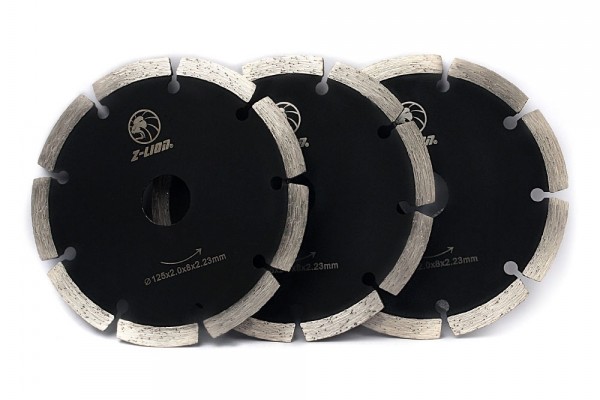Analysis of causes of diamond saw blade chipping
Diamond saw blades are essential tools in various industries and are known for their ability to cut hard materials with precision. However, a common problem users encounter is edge collapse, where the cutting layer of the blade becomes damaged or falls off during use. This phenomenon results in reduced cutting efficiency and shortened blade life. Understanding the causes of edge collapse is critical to maintaining diamond saw blade performance.

Causes of Diamond Saw Blade Edge Collapse
1. The core hardness is not enough
The core of a diamond saw blade plays a vital role in its overall performance. If the hardness of the tool core is insufficient, it will cause several problems:
Bending and crushing: Softer cores are more susceptible to bending and deformation under external forces. This can occur during cutting operations, especially when excessive pressure is applied.
Damage and edge collapse: When the core is bent or deformed, it may cause the diamond particles on the edge to loosen or fall off, causing the edge to collapse.
2. Unreasonable cutting depth
Depth of cut is another important factor that can cause chipping:
Increased stress and wear: If the cutting depth is too deep, the pressure exerted on the saw blade will increase. This increased pressure can cause excessive wear on the blade, making it more susceptible to damage.
Risk of edge collapse: As wear increases, so does the likelihood of edge collapse, especially if the blade is not designed to handle such depths.
3. Cutting speed is too fast
The speed at which a diamond saw blade operates is critical to its longevity and effectiveness:
Material and hardness considerations: Different materials have different hardness levels, and using the same cutting parameters on different materials can cause problems.
Over-fatigue: If you cut too fast, you may cause the blade to over-fatigue. This fatigue can lead to overheating and eventually edge collapse as the blade struggles to maintain its integrity under pressure.
4. Hard usage environment
The environment in which diamond saw blades are used will significantly affect their performance and service life:
Humidity and corrosion: Using diamond saw blades in humid or humid environments may cause rust and corrosion. This deterioration weakens the blade and increases the risk of edge collapse.
Contaminants: Dust, debris, and other contaminants can also affect the cutting performance and life of the blade, causing premature wear and potential edge collapse.
Solution to Diamond Saw Blade Chipping Problem
1. Choose the right diamond saw blade
Material and hardness considerations
Different workpiece materials and their hardness levels require specific specifications and models of diamond saw blades. Using the wrong blade can cause premature wear and edge collapse.
Blade selection: Always choose a diamond saw blade designed specifically for the material you are cutting. For example, harder materials like granite may require different blades than softer materials like concrete.
Avoid uniformity: Do not use the same saw blade on different workpieces. Each material has unique properties that require custom cutting tools.
2. Adjust according to cutting depth
Optimum cutting depth
The cutting depth should be adjusted according to the hardness and thickness of the workpiece.
Avoid excessive depth: Cutting too deep will increase stress and wear on the blade, causing the edge to collapse.
Gradual cuts: If possible, make multiple shallow cuts instead of one deep cut to minimize stress on the blade.
3. Control cutting speed
Speed management
Choosing a reasonable cutting speed is critical to preventing excessive fatigue of the saw blade.
Material-specific speed: Adjust the cutting speed based on the hardness of the workpiece and the specifications of the saw blade.
Monitor performance: If you notice signs of overheating or excessive wear, consider reducing the speed to extend the life of your blades.
4. Create a good working environment
Environmental conditions
The working environment can significantly affect the performance and life of a diamond saw blade.
Dry and clean conditions: Make sure the work area is dry and free of moisture, which can cause rust and corrosion.
Correct storage: Store diamond saw blades in a controlled environment to maintain their quality. Avoid exposing them to moisture or extreme temperatures, which can reduce their performance over time.
In Conclusion
Diamond saw blades are ideal cutting tools commonly used in industrial production, but they may also have problems such as edge collapse during use. Understanding the causes of these problems and taking corresponding preventive measures can effectively extend the life of diamond saw blades and improve their cutting efficiency.
 English
English  Português
Português  русский
русский  Chinese
Chinese  French
French  Japanese
Japanese  Spanish
Spanish 



